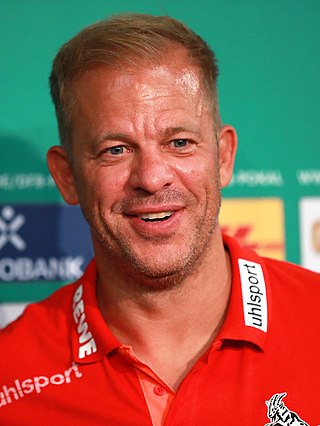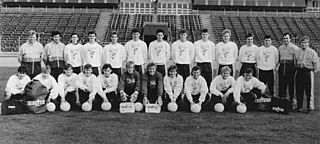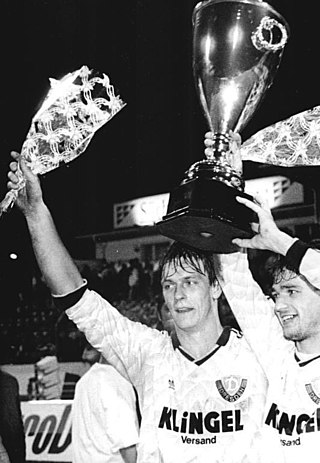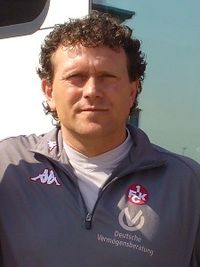
1. Fußball-Club Kaiserslautern e. V., also known as 1. FCK, FCK, FC Kaiserslautern, K'lautern or colloquially Lautern, is a German sports club based in Kaiserslautern, Rhineland-Palatinate. In addition to football, the club also operates in several other sports.

Thomas Jens Uwe Doll is a German professional football manager and a former football player. As a player, he played as an attacking midfielder for F.C. Hansa Rostock, BFC Dynamo, Hamburger SV, Lazio, Eintracht Frankfurt and Bari.

Matthias Sammer is a German football official and former player and coach. He played as a defensive midfielder and later in his career as a sweeper.

Ulf Kirsten is a German former professional footballer who played as a striker. Nicknamed Der Schwatte, he is the first player in history to reach a total 100 caps playing with two different national teams. Kirsten's biggest success was the victory of the 1992–93 DFB-Pokal.

Sportgemeinschaft Dynamo Dresden e.V., commonly known as SG Dynamo Dresden or Dynamo Dresden, is a German association football club based in Dresden, Saxony. They were founded on 12 April 1953 as a club affiliated with the East German police and became one of the most popular and successful clubs in East German football, winning eight league titles.
The 1997–98 Bundesliga was the 35th season of the Bundesliga, Germany's premier football league. It began on 1 August 1997 and ended on 9 May 1998. FC Bayern Munich were the defending champions. FC Kaiserslautern won the Bundesliga on 1 May 1998 with one match remaining, the only time to date that a newly promoted team has won the league.

Ferydoon Zandi is an Iranian retired professional footballer.

Markus Anfang is a German retired footballer and manager who is the head coach 2. Bundesliga club of 1. FC Kaiserslautern.

Torsten Gütschow is a German football manager and former player who played as a striker. He is most associated with Dynamo Dresden, with whom he had two successful spells, playing top level football in East Germany and after reunification. In between these he played for three other German clubs, and spent six months with Galatasaray of the Turkish Süper Lig. A strong and instinctive goalscorer, Gütschow was top scorer in each of the last three seasons of the DDR-Oberliga, and was the last East German Footballer of the Year. He won three international caps for East Germany, scoring two goals between 1984 and 1989. Since retiring he has taken up coaching, and has been manager of TuS Heeslingen.

Ralf Minge is a German footballer former coach and player who works as sporting director of Dynamo Dresden.

Jörn Lenz is a German former professional footballer who played as a defender. Lenz had four different spells with BFC Dynamo during his professional playing career and has continued to serve as part of the club's backroom staff since retiring in 2008. Lenz played a total of 374 matches for BFC Dynamo between 1988 and 2008. He made two appearances for BFC Dynamo in the 1989-90 European Cup Winners' Cup.

The Deutschland-Cup was a one-off football competition played in November 1990, to celebrate German reunification. The match was played one week after the dissolution of the East German Football Association and its merger with the German Football Association, and featured the reigning champions of East and West Germany, Dynamo Dresden and Bayern Munich respectively. The match, which was played at the Rudolf-Harbig-Stadion in Dresden, was won 1–0 by Dynamo.

Akaki Gogia is a professional footballer who plays as a winger or attacking midfielder for SC Freital.
The 1994–95 season was Dynamo Dresden's fourth, and to date last, season in the Bundesliga. It was a fairly disastrous season for the club – they finished at the bottom of the table, winning only four league games, including a 21-game winless streak, from October to May. The club got through three managers: Sigfried Held was replaced by another former Germany international striker, Horst Hrubesch, who lasted only four months, before former Dynamo forward Ralf Minge took over for the remainder of the season.
The 1993–94 season was Dynamo Dresden's third season in the Bundesliga. They finished in 13th place, to date their best performance since German reunification. After a slow start, they went on a 10 match unbeaten run during the middle of the season, and won three of their last five games to finish well clear of the relegation zone. Dynamo were masters of the 1–0 win, thanks in part to loan signing Marek Penksa, and top scorer Olaf Marschall, who'd been signed from Admira Wacker during pre-season.
The 2012–13 2. Bundesliga was the 39th season of the 2. Bundesliga, Germany's second-level football league. The season began on 3 August 2012 and ended with the last games on 19 May 2013, with a winter break held between the weekends around 15 December 2012 and 2 February 2013.
The 1990–91 FC Bayern Munich season was the 91st season in the club's history and 26th season since promotion from Regionalliga Süd in 1965. Bayern finished three points behind champions 1. FC Kaiserslautern in the Bundesliga. In the DFB-Pokal, Bayern were eliminated in the first round for the first time in club history. Bayern reached the semifinals of the European Cup before being eliminated by Red Star Belgrade due to an own goal in the 90th minute of the second leg. The first competitive match of the season was the DFB-Supercup on 31 July which Bayern won by a score of 4–1 over 1. FC Kaiserslautern.
The rivalry between football teams from East Germany and West Germany lasted from 1949 to 1990.
Tim Rieder is a German professional footballer who plays as a defensive midfielder for Greek club PAS Giannina.












